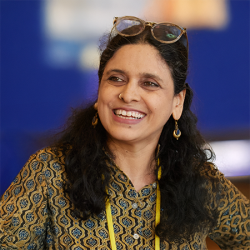Approaches Towards Meaningful Connectivity in the Global South
Paradigm Initiative
Session 215
WSIS Action Line C1 calls on the government and relevant stakeholders to promote ICTs for development. However, the extent of digital exclusion in the Global South and access to digital technologies is a major concern, often due to poor digital infrastructure and lack of transparency. This divide exacerbates inequalities in accessing information and services, hindering efforts to create an inclusive information society. Globally it is estimated that at least 2,6 billion people are unconnected, with marginalised communities often lacking connectivity and digital skills. The session spotlights approaches to achieving meaningful connectivity in the Global South and provides case studies on the implementation of the universal service fund in 27 countries in Africa, based on findings from Paradigm Initiative’s 2024 Londa report. PIN’s Londa report flags gaps and challenges that are barriers to the realisation of the 2030 Agenda for Sustainable Development, the Global Digital Compact and the African Digital Compact (ADC). The discussion will provide a pathway for the realisation of WSIS Action line C1 and spotlight the role of governments in supporting approaches to achieving meaningful connectivity.





-
 C1. The role of governments and all stakeholders in the promotion of ICTs for development
C1. The role of governments and all stakeholders in the promotion of ICTs for development
WSIS Action Line C1 calls on the government and relevant stakeholders to promote ICTs for development. However, there is a persistent digital divide, particularly between developed and developing countries and within countries. The discussion will provide a pathway for the realisation of WSIS Action line C1 and spotlight the role of governments in promoting approaches to achieving meaningful connectivity.
-
 Goal 5: Achieve gender equality and empower all women and girls
Goal 5: Achieve gender equality and empower all women and girls
-
 Goal 9: Build resilient infrastructure, promote sustainable industrialization and foster innovation
Goal 9: Build resilient infrastructure, promote sustainable industrialization and foster innovation
-
 Goal 10: Reduce inequality within and among countries
Goal 10: Reduce inequality within and among countries
-
 Goal 16: Promote just, peaceful and inclusive societies
Goal 16: Promote just, peaceful and inclusive societies
The session is in line with SDG 16 target 16.10, which highlights the need to ensure public access to information and protect fundamental freedoms in accordance with national legislation and international agreements. The session directly addresses this target by analysing access to information and freedom of expression in the digital sphere.
The session seeks to address SDG 10, Target 10.2 which highlights the urgent need to empower and promote the social, economic and political inclusion of all, irrespective of age, sex, disability, race, ethnicity, origin, religion or economic or other status. The digital divide, highlighted in one of the reports, the Londa Report, exacerbates existing inequalities. The session's focus on digital inclusion and access to information contributes to reducing these disparities.
The session is in line with SDG 9 Target 9.c, which sought to provide universal and affordable access to the Internet by 2020. Despite the year marker for achieving SDG 9c having passed, the session’s focus on digital infrastructure and connectivity contributes to achieving this target and the 2030 Agenda for Sustainable Development.
Londa 2024: https://paradigmhq.org/wp-content/uploads/2025/04/Londa-2024-2.pdf
Londa 2023: https://paradigmhq.org/londa-23/
https://www.itu.int/en/mediacentre/Pages/PR-2023-09-12-universal-and-meaningful-connectivity-by-2030.aspx